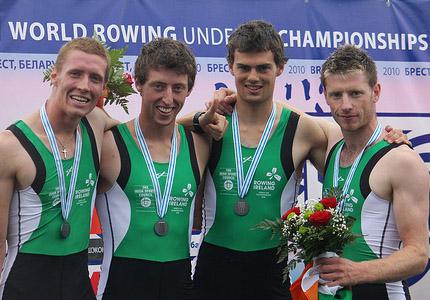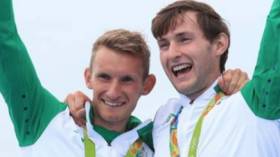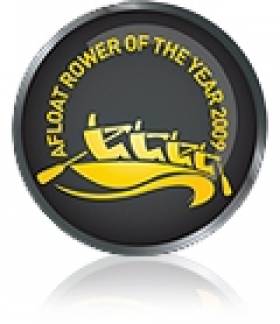Displaying items by tag: Rowers of the Year
O'Driscoll and O'Donovan are Afloat Rowers of the Year
#Rowers of the Year: The Afloat Rowers of the Year for 2017 are Shane O’Driscoll and Mark O’Donovan. The two formed the Ireland lightweight pair which won European and World Championship gold. They also won gold in each of the three World Cup regattas, in Belgrade, Poznan and Lucerne. Their glorious run was the pay-off for enormous amounts of work – and a drive which came from their determination to make their mark after coming up short the in 2016, when they finished fourth at the World Championships.
The two have opted to move up to heavyweight with the aim of competing at the Olympic Games in Tokyo in 2020. Afloat wishes them every success.
Afloat Rower of the Month awards: The judging panel is made up of Liam Gorman, rowing correspondent of The Irish Times, and David O'Brien, editor of Afloat magazine. Monthly awards for achievements during the year appeared on afloat.ie.
Gary and Paul O'Donovan Afloat Rowers of the Year
#Rowers of the Year: The Afloat Rowers of the Year for 2016 are Paul O’Donovan and Gary O’Donovan. Between them they brought Ireland two gold medals and two silvers at top international events in 2016.
The highlight was the silver medal at the Olympic Games in Rio de Janeiro in August for the Ireland lightweight double. The O’Donovan brothers covered the early part of the race more in contact with the field than has become their normal style and in an exciting finish they split gold medallists France and bronze medallists Norway to become the first Irish rowers to mount the podium at an Olympic Games.
Paul O’Donovan has spoken more than once about the frustration of watching that race, as he did not win. The 22-year-old UCD oarsman is phenomenally disciplined in pursuit of his sporting goals. He showed this in 2016 by travelling on from Rio de Janeiro to Rotterdam to compete in the lightweight single sculls at the World Championships. He won every race there. He let the race develop in front of him in the final and then sprinted past the other competitors to win by a clear water margin. He was the only rower to compete successfully at World Championship and Olympic level in 2016.
The O’Donovans had laid down their markers early on as a lightweight double: they took silver behind South Africa at the World Cup in Varese in Italy and then beat Norway to take gold at the European Championships in Brandenburg in Germany. The wild conditions were frightening for some, but the two men from west Cork made light of them. Whatever the weather, they are competitors.
Two of the best Ireland has seen.
The O’Donovans are the Afloat Rowers of the Year 2016.
Rower of the Month awards: The judging panel is made up of Liam Gorman, rowing correspondent of The Irish Times, and David O'Brien, editor of Afloat magazine. Monthly awards for achievements during the year appeared on afloat.ie.
Quadruple Scull Named Rowers of the Year
It was a good year for Irish rowing: among the highlights were an Ireland eight taking bronze at the World University Championships; John Keohane winning the single sculls title at the World Coastal Rowing Championships; Siohan McCrohan and Claire Lambe reaching A Finals at World Cup and European Championship level. At home, NUIG won the senior eights title after another great battle with Queen's. Standing out above the rest, however, is the achievements of the four men who made up the Lightweight Quadruple Scull which took silver at the World Under-23 Championships. Niall Kenny, Michael Maher, Mark O'Donovan and Justin Ryan (pictured below) are the Afloat Rowers of the Year 2010.

Rower of the Year award: The judging panel is made up of Liam Gorman, rowing correspondent of The Irish Times, President of Rowing Ireland Anthony Dooley and David O'Brien, Editor of Afloat magazine. Monthly awards for achievements during the year have appeared on afloat.ie. The overall national award goes to the person or crew who, in the judges' opinion, achieved the most notable results in, or made the most significant contribution to rowing during 2010. Thanks for your interest!






























































